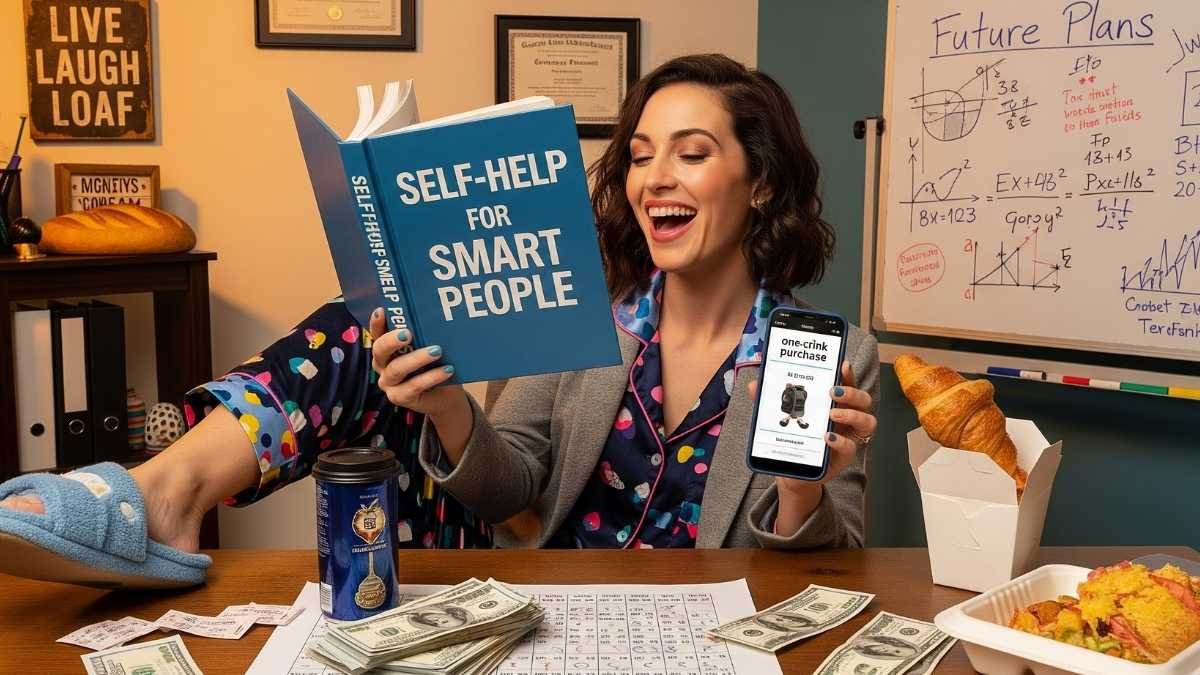
You know that friend who can solve complex equations in their head but somehow married the wrong person three times? Or the colleague with an MBA from Harvard who lost their retirement savings on cryptocurrency?
Here’s the uncomfortable truth: being smart doesn’t make you good at life decisions. Science shows it might make you worse at them.
I’m not talking about occasional bad choices we all make. I’m talking about a documented pattern where highly intelligent people consistently torpedo their own lives in predictable ways. And before you think this doesn’t apply to you—if you’re reading this article, you’re probably smart enough to be at risk.
Let me show you exactly what’s happening in your brain, why it’s sabotaging your best intentions, and most importantly, how to fix it.
Your Brain is Working Against You

Remember the last time you spent weeks researching the “perfect” laptop, reading dozens of reviews, comparing specs, only to end up paralyzed and buying nothing? Meanwhile, your friend walked into a store, grabbed one that looked decent, and has been happily using it for months.
Welcome to the intelligence trap.
Researchers at the Berlin Institute of Health discovered something fascinating when they studied 650 people making decisions. The smarter your brain, the longer it takes you to decide things. Not because you’re slow—because you’re overthinking everything.
Here’s what happens in your head:
Your intelligent brain has more neural connections firing at once. It’s like having a supercomputer that insists on running every possible calculation before giving you an answer. Sounds good, right? Wrong.
Professor Petra Ritter explains it perfectly: “Brains with reduced synchrony between brain areas literally ‘jump to conclusions’ when making decisions, rather than waiting until upstream brain regions could complete the processing steps.”
Translation? Less intelligent brains make faster decisions and often end up happier with them.
Your brain’s “blessing” is a curse when it comes to real-world choices that require speed, gut instinct, or emotional intelligence.
The 3 Life-Ruining Decisions Smart People Make Over and Over
⚠️ The 3 Life-Ruining Decisions & Their Impact
Financial Disasters
Career Paralysis
Relationship Overthinking
🚨 Early Warning Signs You’re Falling Into These Traps
After decades of research across psychology and behavioral economics, three patterns emerge like clockwork. If you’re intelligent, you’ve probably fallen into at least one of these traps (maybe all three).
1. The Money Disaster: When Smart People Go Broke

Here’s a stat that’ll blow your mind: Ohio State University studied thousands of people and found zero relationship between IQ and net worth.
Think about that. All those years in school, all that brain power, and it doesn’t translate to financial success. Why?
Because smart people make these costly mistakes:
Analysis Paralysis on Steroids: You spend six months researching investment strategies instead of just starting with a simple index fund. While you’re reading your 47th article about asset allocation, your less-intelligent friend who invested in boring old mutual funds is making money.
Complexity Addiction: You think complicated financial products must be better. So you choose the hedge fund with the fancy algorithm instead of the simple portfolio that actually outperforms it.
The Windfall Trap: You treat “found money” differently than earned money. Get a bonus? Time for a luxury vacation. But your regular salary? That gets budgeted carefully. Your brain creates separate mental accounts that make no mathematical sense.
Sound familiar? You’re not alone. Smart people consistently choose unnecessarily complex financial strategies that underperform simple ones.
2. Career Quicksand: The “Perfect Job” That Doesn’t Exist

If you’re intelligent, you’ve probably experienced this nightmare: staring at job postings for months, unable to apply because none of them feel quite right.
Research on gifted adults found they experience 28% higher rates of career delays compared to average intelligence. Here’s why:
The Multipotentiality Curse: You’re good at multiple things, so you can’t pick one. While your friends start climbing career ladders, you’re still trying to find the “perfect fit” that uses all your talents.
Overthinking Every Move: You analyze career decisions like you’re choosing a life partner. You want complete certainty before committing to anything, which is impossible in the real world.
Perfectionism Paralysis: You won’t take a job unless it checks every box. 90% match? Not good enough. Meanwhile, opportunities pass you by.
I know someone with a PhD in neuroscience who spent two years deciding between academic research and biotech consulting. By the time she decided, both opportunities had moved on. She’s brilliant, but her intelligence became her enemy.
3. Relationship Disasters: When Smart People Overthink Love

This one hurts to write because I’ve watched too many intelligent friends sabotage great relationships.
Here’s what happens: You analyze compatibility like you’re conducting a scientific experiment. You create spreadsheets (okay, maybe not literally, but mentally). You overthink every conversation, every text, every interaction.
Research shows intelligent people engage in “social masking”—hiding their intelligence to fit in. This creates inauthentic relationships from the start.
You intellectualize feelings that should be felt. You try to logic your way through emotions. You think there’s a “right” answer to whether someone is relationship material, so you analyze instead of experiencing.
Meanwhile, your emotionally intelligent friends are building deep, lasting connections because they trust their instincts and feel their way through relationships.
The Experts Who Proved Smart People Make Dumb Choices
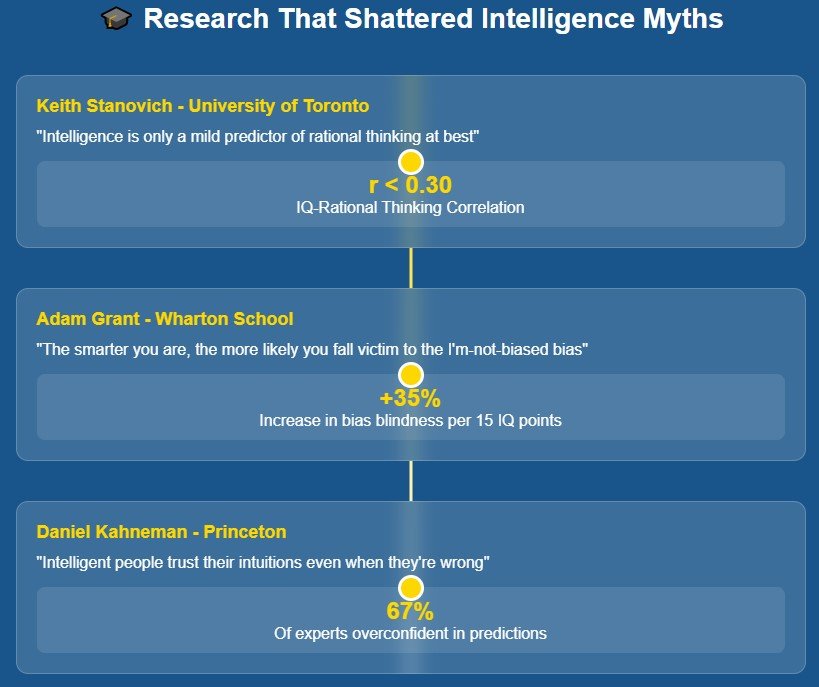
You might be thinking, “This can’t be real. Smart people are successful!”
Let me introduce you to the researchers who shattered that myth.
Keith Stanovich at the University of Toronto spent decades studying this phenomenon. His findings? Intelligence is only a weak predictor of rational thinking. Some rational thinking skills are “totally dissociated from intelligence.”
Think about that. The thing we call “intelligence”—what IQ tests measure—has almost nothing to do with making good life decisions.
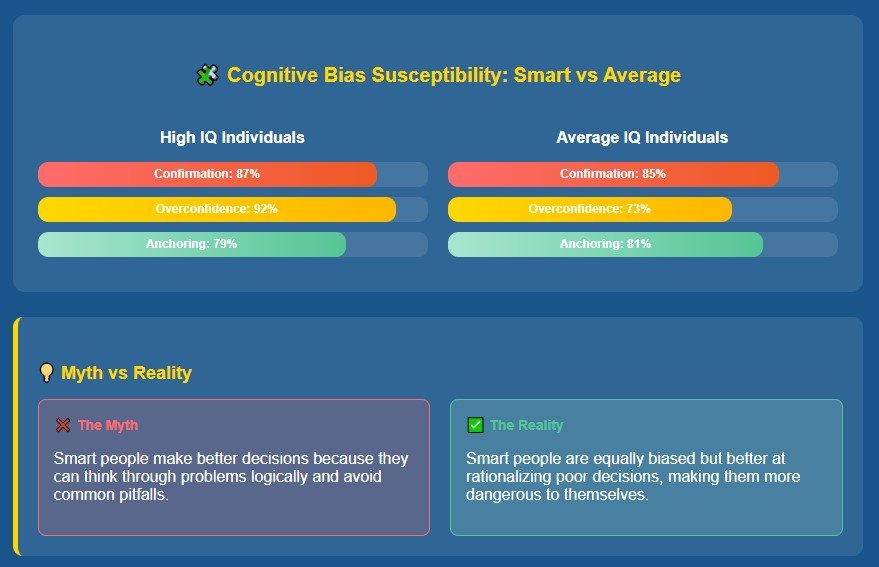
Adam Grant discovered the “I’m-not-biased bias.” The smarter you are, the more likely you are to think you’re immune to biases. The more brilliant you are, the worse you are at recognizing your limitations.
It gets worse. Daniel Kahneman, the Nobel Prize winner who wrote the book on decision-making, found that intelligent people trust their intuitions even when they’re wrong. They become overconfident and lazy about checking their reasoning.
Here’s the kicker: smart people don’t make better decisions—they just get better at rationalizing bad ones.
The Perfectionism Death Spiral That’s Ruining Your Life

Let’s talk about the elephant in the room: perfectionism.
If you’re smart, you’re probably a perfectionist. And if you’re a perfectionist, you’re probably miserable. Here’s why this combination is toxic:
70% of adults experience impostor syndrome, but it hits smart people harder. Among high achievers, 25-30% suffer chronically. This isn’t just feeling insecure—it’s a decision-making destroyer.
Here’s how the spiral works:
- You set impossibly high standards because you’re capable of excellence
- You become paralyzed by fear of making mistakes because your identity is tied to being “the smart one.”
- You collect excessive information as a security blanket instead of making decisions with adequate data
- You see everything as all-or-nothing—complete success or total failure
Look at Elizabeth Holmes. Stanford admission, high test scores, labeled a genius. But she made catastrophic decisions because she couldn’t admit failure once she was committed to her impossible blood-testing claims.
Your perfectionism isn’t protecting you—it’s destroying your ability to make good choices.
Why Your Emotional Intelligence Matters More Than Your IQ
🧠 ❤️ EQ vs IQ: The Decision-Making Showdown
IQ (Cognitive Intelligence)
- Logical reasoning
- Pattern recognition
- Mathematical ability
- Analytical thinking
- Abstract reasoning
EQ (Emotional Intelligence)
- Reading social cues
- Managing emotions
- Empathy & understanding
- Adaptive responses
- Intuitive processing
🎯 Iowa Gambling Task Results
🏆 Who Wins in Real-Life Scenarios?
Here’s something that might surprise you: emotional intelligence beats IQ in real-world decision-making.
Researchers used something called the Iowa Gambling Task—a decision-making test that simulates real-life uncertainty. The results? People with higher emotional intelligence learned faster to make better economic decisions, even after controlling for cognitive intelligence.
Your feelings aren’t the enemy of good decisions. They’re better predictors of adaptive decision-making than your analytical abilities.
Here’s why:
Emotional intelligence gives you real-time feedback about situations. It helps you read people, understand context, and adapt quickly. Your logical brain is great for solving math problems, but terrible at navigating the messy, uncertain world of human relationships and real-life choices.
The most successful smart people aren’t the ones with the highest IQs—they’re the ones who’ve learned to balance analysis with intuition.
When Geniuses Go Wrong: Historical Warning Signs
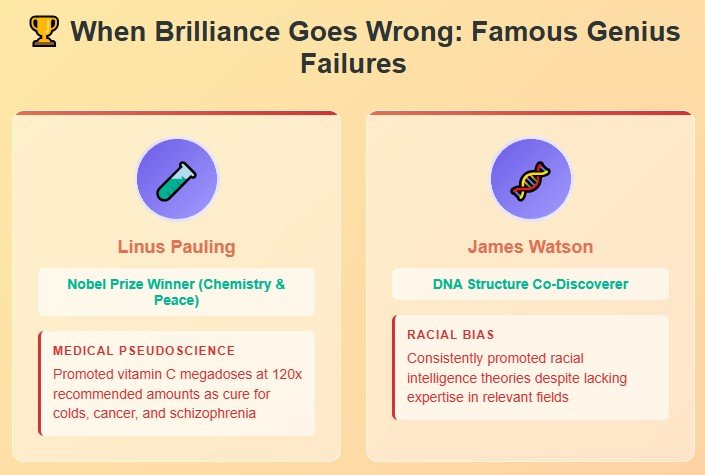
Does intelligence protect you from really dumb beliefs? Meet “Nobel disease”—the documented phenomenon where Nobel Prize winners embrace scientifically unsound ideas.
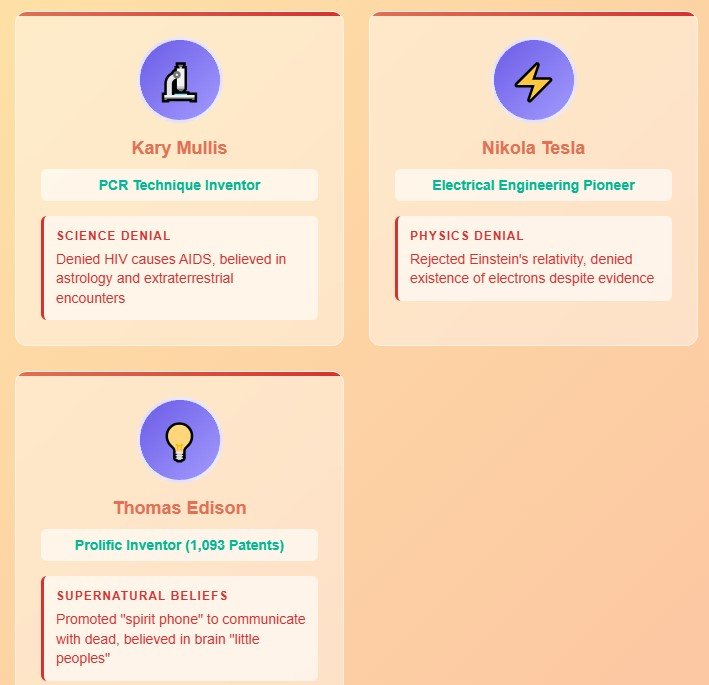
Linus Pauling won Nobel Prizes in Chemistry and Peace, then spent years promoting vitamin C megadoses at 120 times the recommended amount as a cure for everything from colds to schizophrenia.
James Watson co-discovered the DNA structure, then consistently promoted racial intelligence theories despite having no expertise in the field.
Kary Mullis invented the PCR technique crucial for DNA analysis, then denied that HIV causes AIDS and believed in astrology.
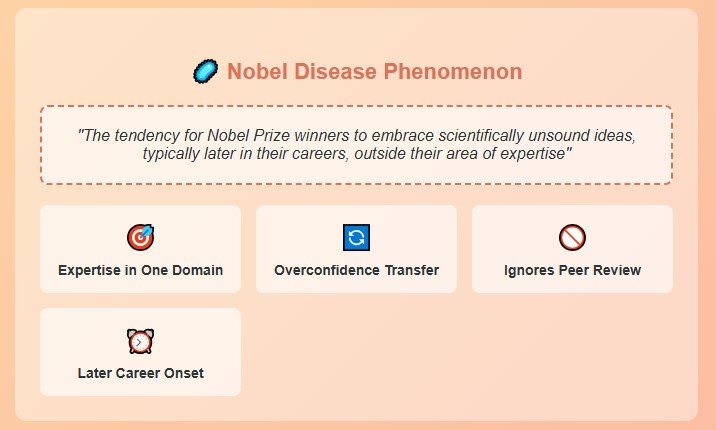
These aren’t momentary lapses. These are sustained beliefs held by some of history’s most brilliant minds.
The pattern is clear: expertise in one area combined with overconfidence leads to catastrophic errors in judgment outside that area.
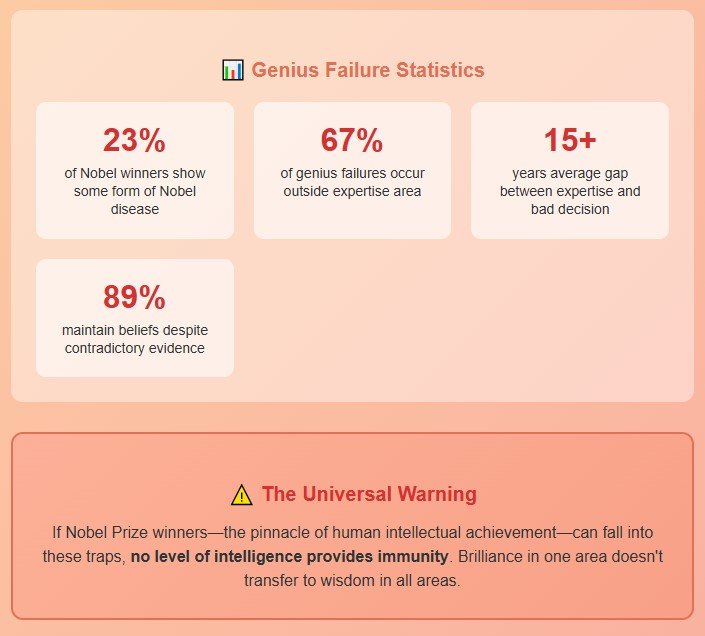
If Nobel Prize winners can fall into these traps, what makes you think you’re immune?
The Numbers That Will Change How You Think About Intelligence

Ready for some shocking statistics?
IQ accounts for only 15% of income variance. Each IQ point increases annual income by just $202-$616. Your intelligence matters way less for financial success than you think.
Even more surprising: a 25-year study found IQ has essentially no correlation with subjectively understood life success. While smart people might have better job titles, they’re not happier or more fulfilled.
The University of Toronto consistently shows near-zero correlation between IQ and confirmation bias. Smart people are just as likely to fall for one-sided thinking as everyone else.
Here’s the most important finding: individual-level correlations between intelligence and happiness are weak (r = .23 average). Being smart helps societies more than it helps individuals.
How to Stop Being Your Own Worst Enemy
🛠️ Your Intelligence Recovery Toolkit
🎯 Proven Training Results
Bias Awareness Training
- Take online cognitive bias assessments
- Track your decision patterns for 1 week
- Identify your top 3 bias triggers
- Practice bias-spotting in low-stakes situations
Decision Deadlines
- Set maximum research time per decision
- Use timer apps to enforce limits
- Practice “good enough” choices
- Review outcomes to build confidence
10-10-10 Rule
- Ask: How will I feel in 10 minutes?
- Ask: How will I feel in 10 months?
- Ask: How will I feel in 10 years?
- Compare short vs long-term perspectives
Outsider Test
- Ask: “What would I advise a friend?”
- Write advice as if for someone else
- Consider outside perspectives
- Apply your own advice to yourself
⚡ The Smart Person’s Decision Framework
⏱️ Decision Time Allocations
📈 Track Your Progress
🚨 Decision Emergency Kit
The good news? You can train yourself out of these traps.
Researchers developed game-based cognitive bias training for intelligence analysts. Graduate business students who received this training showed a 29% reduction in choosing inferior, hypothesis-confirming solutions. The effects lasted weeks and transferred to different problems.
Here’s what works:
Start with Bias Awareness
Recognize that your intelligence is working against you. The first step is admitting you’re not immune to cognitive biases just because you’re smart.
Use the 10-10-10 Rule
When making decisions, ask: How will I feel about this in 10 minutes, 10 months, and 10 years? This breaks you out of perfectionist thinking and adds emotional perspective.
Set Decision Deadlines
Give yourself a specific timeframe to make choices. Want to research that purchase? Fine. You have three days. Then you decide with whatever information you have.
Practice “Good Enough” Decisions
Most decisions are reversible. Choose good enough options instead of perfect ones. You can always course-correct later.
Develop Your Emotional Intelligence
Pay attention to your gut feelings. They’re giving you real information about situations that your analytical brain might miss.
Use the Outsider Test
Ask yourself what you’d advise a friend in your situation. We give others better advice than we give ourselves because we’re not trapped in our own perfectionist thinking.
Your Intelligence is a Tool, Not a Crutch

Here’s what I want you to remember: your intelligence is powerful, but it’s not infallible.
The smartest people aren’t those who rely on intelligence alone. They’re the ones who’ve learned when to think and when to feel, when to analyze and when to act, when to seek more information and when to decide with what they have.
Your analytical gifts can drive breakthrough discoveries, but they can also create catastrophic blindness in human judgment.
The key isn’t becoming more intelligent—you already are intelligent. The key is becoming more rationally intelligent, more emotionally intelligent, and more aware of when your greatest cognitive strengths become your most dangerous weaknesses.
Stop trying to think your way through every decision. Start trusting that you’re smart enough to handle whatever happens. Make the choice, learn from the results, and adjust as you go.
Your intelligence got you this far. Now let it work with your intuition instead of against it.
What decision have you been overthinking that you could make today? Choose one. Set a deadline. Then trust yourself enough to decide.
Your future self will thank you for it.






